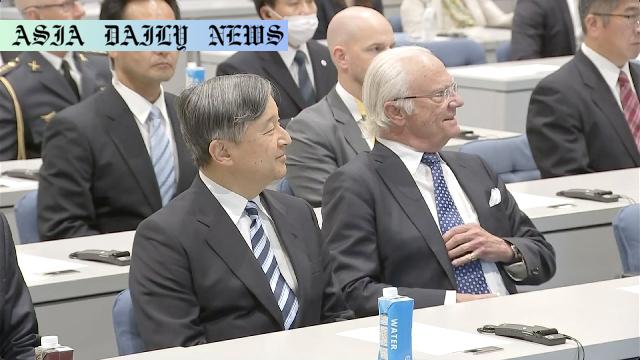Water Management – Japan’s Emperor Naruhito and Sweden’s King Carl XVI Gustaf discuss sustainable solutions in Tokyo seminar.
Japan’s Emperor and Sweden’s king attended a water seminar in Tokyo.
Discussions focused on sustainable water management to combat climate change.
Around 300 experts, including University of Tokyo Professor Oki Taikan, participated.
Key topics included sustainability of forests, dams, and human communities.
The event was co-hosted by the Swedish Embassy and Stockholm-based research institute.

Introduction to Water Management Seminar
On a significant occasion in global environmental dialogue, Japan’s Emperor Naruhito and Sweden’s King Carl XVI Gustaf congregated at a seminar in Tokyo to discuss the importance of water in combating climate change. Organized by the Swedish Embassy and a renowned Stockholm-based water research institute, the event highlighted the growing awareness and need for sustainable water management strategies. Hosted within the academic precincts of the United Nations University Headquarters in Tokyo, the initiative saw participation from around 300 experts, academics, and policymakers dedicated to environmental sustainability.
Recognized globally for his profound understanding of water-related issues, Emperor Naruhito joined King Carl XVI Gustaf in leading conversations on pragmatic approaches to water conservation and climate adaptation. Their presence underscored the backing of global leaders toward addressing a challenge critical to humanity’s future. The seminar served as an intellectual hub, bringing together diverse perspectives and cutting-edge ideas.
Insights from Keynote Speakers
The seminar featured an illustrious panel of speakers, with University of Tokyo Professor Oki Taikan offering critical insight into water management. Renowned for his expertise on the Earth’s water circulation systems, Professor Oki emphasized the intricate interplay between natural resources—such as forests and rivers—and man-made infrastructure, such as dams. He warned that the sustainability of these systems is deeply intertwined with human actions. Without addressing the holistic relationship between nature and humanity, debates on water management would remain incomplete, he remarked.
Tying infrastructure management to broader ecological goals, Professor Oki shed light on how sustainable development is contingent upon foresighted policies. His perspective resonated with the broader theme of the seminar, which advocated integrating scientific understanding with practical solutions—particularly in areas vulnerable to global warming-induced disruptions.
A Collaborative Global Effort
The visit by King Carl XVI Gustaf to Japan has been notable not just for this seminar but also for his involvement in the World Expo in Osaka. His collaboration with Emperor Naruhito highlights the importance of cross-cultural dialogue in addressing global issues. Earlier, the Emperor and his immediate family, including Empress Masako and Princess Aiko, hosted an honorary dinner for the Swedish monarch at the Imperial Palace. Such events underscore the critical role diplomatic relations play in fostering partnerships focused on environmental progress.
As water scarcity and extreme weather events become increasingly common worldwide, this seminar emphasized the notion that no single nation can tackle such challenges in isolation. The collaborative effort demonstrated in Tokyo serves as a model for future global partnerships targeting environmental concerns.
The Road Ahead
As the seminar concluded, it became clear that global initiatives fostering collaboration, education, and actionable solutions are indispensable in the fight against climate change. The participation of esteemed leaders and experts at the Tokyo event sends a strong signal to the world about the importance of water as an invaluable resource. Through collective efforts, humanity can pave the way toward a more sustainable and resilient future.



Commentary
The Importance of Global Collaboration in Water Management
The seminar hosted in Tokyo with the presence of Japan’s Emperor Naruhito and Sweden’s King Carl XVI Gustaf highlights the significance of collective global action. Water remains one of the most critical resources for life on Earth, and its efficient management is pivotal in combating the adverse effects of climate change. With two prominent global leaders spearheading the discourse, this event exemplifies how international collaboration is indispensable in tackling environmental challenges that transcend borders.
A Holistic Perspective Toward Sustainability
One of the most compelling takeaways from the seminar was Professor Oki Taikan’s emphasis on holistic sustainability. The acknowledgment of interconnected systems—ranging from natural ecosystems like forests and rivers to human-made infrastructures like dams—echoes the reality that humanity must consider the broader ecological implications of resource development. The interconnectedness of these elements calls for thoughtful dialogue and technological innovation. Leaders attending the seminar underline the importance of integrating scientific evidence into policy-making to ensure harmonious coexistence between human development and nature.
The Role of Leaders and Experts in Inspiring Change
The presence of eminent personalities such as Emperor Naruhito and King Carl XVI Gustaf has undeniably added an essential layer of credibility and visibility to the issue of water management. Their participation sends out a powerful message to the global community: water security is not solely an environmental issue but a matter of international diplomatic significance. When leaders unite to advocate proactive measures, it inspires both grassroots movements and policy-level changes. It is this alignment of vision at all levels that brings us closer to actionable outcomes for a sustainable future.